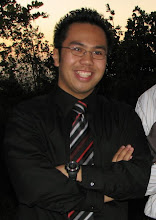3.25.2010
Mile 1201: Constantly Judged
SKATERS GET THEIR SCORES
IN A "KISS AND CRY"
The passion for perfection can be seen in something my mom has our family watching for dinner every day: figure skating. I know, not a manly sport, but let me make a point here. We were watching one of the post-olympics championships, and I watched one skater prep-up for a triple axle, one of the significant jumps needed to be completed for a significant score in his program.
The anticipation was felt. The crowds eyes were on the skates. The skater's eyes were focused. His leg goes up... and he singles the jump.
Okay, so skaters make mistakes once in a while. The skater sets up once again, this time a triple-triple combination, according to the announcer.
The anticipation was felt. The crowds eyes were on the skates. The skater's eyes were focused. His leg goes up... and he singles the jump.
I'm glad the skater couldn't hear what the announcer was saying. All the talk about disappointment, not matching a highly expected performance, and how the failed jumps marked the end of his program. "A disaster," was the way they had put it. I could see the negative comments discouraging the skater from completing his performance. So, I give him kudos for the strength that he pulled off in putting that disappointment behind and finishing off his program, even though he knew he could no longer make up for his mistakes.
The skater was definitely not a slacker, as he had to work hard to get to this stage. However, I could feel the pain that he had as he was up on the "kiss & cry" waiting for his scores. After hours and hours of practicing to get to perfection (like many other figure skaters), I could see the skater's face in deep, deep disappointment. It seemed that he was feeling like nothing paid off: the judges gave him a score that was only a fraction of his average marks.
----
I feel that becoming a doctor is the same. We go through hours and hours trying to dig deep into our profession, either by putting our heads into books or spending long hours at the hospital or the office for experience. And just like figure skating, one can read all about medicine and know about the in's and out's of a hospital, but without that practical real-life practice, the information is useless.
As I'm beginning this new leg of this journey, I'll admit it is tough to take 2 years of basic sciences, and now add on clinical thought to make sure as a doctor I can think on my feet and do things right. But yet I feel that with every patient, I'm not exactly there. And its kinda disheartening as I believe the essence of perfection is needed to take care of every patient and their needs. Either, I'm missing a question here or there when taking a history or I'll miss a couple differential diagnoses on a patient. My body keeps telling me, I can't miss details.
The patients and the doctors are there judging me with every move. The former for trust, the latter for grades & marks.
Yes, I know, perhaps I am complaining too early (6 weeks into my 78 weeks of clinical rotations), but I believe that to do well in medicine, I believe I have to earn the trust of my patients. And that can't be done without proper personal relationships, a good medical knowledge base, and an ability to think clinically (what I now call "across the board thinking", I'll explain in a later entry). I feel that with each mistake I make it harder for a patient to trust me. Well, I'll need to be patient with myself, because perfection can be achieved through the beneficial lesson that each mistake teaches me.
I think I need to strive for perfection more. It's the only way I can be an asset to my patients and to my field. I'm just thankful the doctors and patients don't put us through the "kiss and cry."
Subscribe to:
Post Comments (Atom)



No comments:
Post a Comment